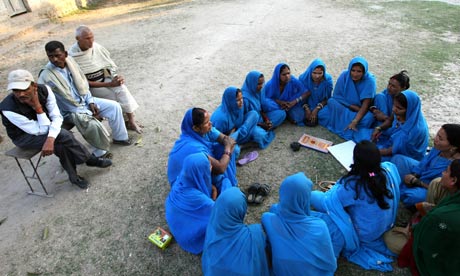UN women report: Access to justice remains a work in progress
by editor | 2011-07-06 8:02 am
![]()
Flagship report from the new UN agency shows there is a way to go before improvements in the legal position of women are translated into equality and justice for all
Madeleine Bunting

Nepalese women from Bakduwa para-legal committee meet in Saptari. According to the UN, Nepal’s supreme court ordered parliament to amend its rape law to allow prosecutions for marital rape. Photograph: Prakash Mathema/AFP/Getty Images
More than half of working women in the world, 600 million, are trapped in insecure jobs without legal protection, according to the first flagship report of the new agency UN Women. A similar number do not have even basic protection against domestic violence, it finds, while sexual assault has become a hallmark of modern conflict.
Michelle Bachelet, the executive director of UN Women, said the document showed that many millions of women had no access to justice.
“The report reminds us of the remarkable advances that have been made over the past century in the quest for gender equality and women’s empowerment,” she said. “However it also underscores the fact that despite widespread guarantees of equality, the reality for many millions of women is that justice remains out of reach.”
For millions of women in both rich and poor countries, the search for justice is fraught with difficulty and is often expensive; laws and legal systems frequently discriminate against them. In Cambodia, for example, the forensic test necessary to lay a rape charge costs two weeks’ wages, while in Kenya a land claim in an inheritance case can cost $800 and extend across 17 different administrative stages.
Progress of the World’s Women: In Pursuit of Justice is a comprehensive survey of women’s access to justice across the globe. The report offers 10 recommendations to overcome the paradox that while huge improvements have been made in the legal position of women over the last century, there is still a dramatic lag in translating that into equality and justice.
For example, 127 countries do not have effective laws on marital rape, and attrition rates in cases brought by women are high, ensuring that only a fraction of reported rapes result in conviction. The report cites one 2009 European study which found that, on average, only 14% of reported rapes ended in a conviction.
The first of the 10 recommendations is providing support for women’s legal organisations, which often step into the gaps left by inadequate legal aid systems. In a number of countries, women’s groups have been at the forefront of cases that have led to laws being repealed, or new laws created, with a positive impact on women’s lives. In Nepal, for example, the supreme court ordered parliament to amend the rape law in 2002 to allow prosecutions for marital rape after a case brought by the Forum for Women, Law and Development. In Indonesia, a local NGO has trained community-based paralegals to support women to use the religious courts to get the marriage and divorce certificates they need to claim benefits.
 Printable version[2]
Printable version[2] Send to a friend
Send to a friend Share
Share Clip[3]
Clip[3] Contact us[4]
Contact us[4]-
 larger[5] | smaller[6]
larger[5] | smaller[6]
Global development[7]
- UN Women report 2011[8]
World news[9]
- Gender[10]
More news [11]
-
More on this story
-

Women’s strength, industry and wisdom are humanity’s greatest untapped resource
Michelle Bachelet: UN Women’s justice report is a reminder of a potential we can’t afford to waste
See also
-
6 Jul 2011
Sudoku 1,918 medium[12]
-
5 Jul 2011
E coli outbreak blamed on Egyptian fenugreek seeds[13]
-
5 Jul 2011
What is the greenest pension? | Leo Hickman[14]
-
6 Jul 2011
Australia plans plain packaging for cigarettes[15]
-
27 Jan 2011
Women’s rights are in danger of becoming a wordfest[16]
-
29 Mar 2004
It’s reigning men[17]
-
18 Apr 2011
Kenyan girls fight back against genital mutilation[18]
-
21 Nov 1999
Death in the penalty area[19]
 [20]
[20]
- how little funding: http://www.guardian.co.uk/global-development/2011/jul/06/un-women-gender-equality-underfunded
- [Image]Printable version: http://www.guardian.co.uk/global-development/2011/jul/06/un-women-report-access-to-justice/print
- [Image]Clip: http://www.guardian.co.uk/users/clippings/add?r2PageId=1601081
- [Image]Contact us: http://www.guardian.co.uk/contactus/1601081
- larger: http://www.guardian.co.uk/help/accessibility
- smaller: http://www.guardian.co.uk/help/accessibility
- Global development: http://www.guardian.co.uk/global-development
- UN Women report 2011: http://www.guardian.co.uk/global-development/un-women-report-2011
- World news: http://www.guardian.co.uk/world
- Gender: http://www.guardian.co.uk/world/gender
- More news : http://www.guardian.co.uk/tone/news
- Sudoku 1,918 medium: http://www.guardian.co.uk/lifeandstyle/2011/jul/06/sudoku-1918-medium?INTCMP=ILCNETTXT3788
- E coli outbreak blamed on Egyptian fenugreek seeds: http://www.guardian.co.uk/world/2011/jul/05/ecoli-outbreak-egyptian-fenugreek-seeds?INTCMP=ILCNETTXT3788
- What is the greenest pension? | Leo Hickman: http://www.guardian.co.uk/environment/green-living-blog/2011/jul/05/green-ethical-pension-funds-investment?INTCMP=ILCNETTXT3788
- Australia plans plain packaging for cigarettes: http://www.guardian.co.uk/world/2011/jul/06/australia-plain-packaging-cigarettes?INTCMP=ILCNETTXT3788
- Women’s rights are in danger of becoming a wordfest: http://www.guardian.co.uk/global-development/poverty-matters/2011/jan/27/un-women-funding-commitment?INTCMP=ILCNETTXT3487
- It’s reigning men: http://www.guardian.co.uk/world/2004/mar/29/gender.comment?INTCMP=ILCNETTXT3487
- Kenyan girls fight back against genital mutilation: http://www.guardian.co.uk/global-development/poverty-matters/2011/apr/18/kenyan-girls-rebel-against-fgm?INTCMP=ILCNETTXT3487
- Death in the penalty area: http://www.guardian.co.uk/world/1999/nov/21/afghanistan?INTCMP=ILCNETTXT3487
- [Image]: http://www.guardian.co.uk/global-development/2011/jul/06/un-women-report-access-to-justice/print
Source URL: https://globalrights.info/2011/07/un-women-report-access-to-justice-remains-a-work-in-progress/